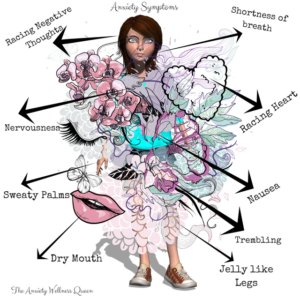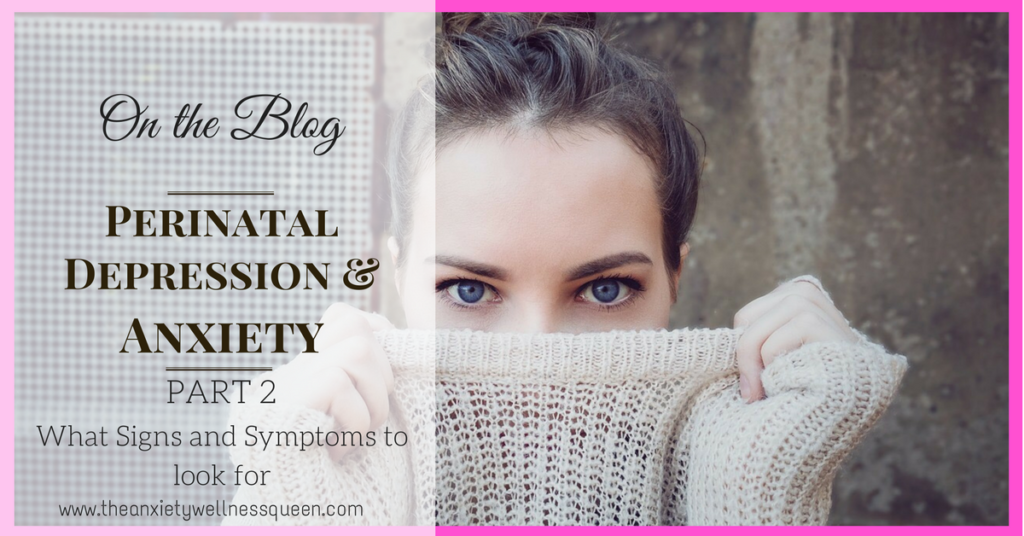Anxiety often reminds me of a chameleon. It has the ability to change and present itself in so many ways. It never discriminates age, gender, race or socio economical status and absolutely does NOT like change! Anxiety is very much a creature of habit that likes to control areas in your life in order to feel ‘safe’. I think one of the most important things to point out here is that anxiety symptoms differ from person to person. There is no one size fits all!
Below I have shared some of the most common signs and symptoms of Perinatal Anxiety and Depression to look out for!
Common symptoms of perinatal depression include, but are not restricted to:
– Low Mood
– Feelings of inadequacy
– Feelings of guilt or shame
– Emotional (you might find yourself crying a lot more than usual)
– Feelings of anger and irritability
– Fear of being alone
– Insomnia
– Reoccurring negative thoughts
– Loss of interest (of things you usually would be interested in)
– Changes in appetite
– Feeling unmotivated
– Withdrawing from social situations
– Thoughts about harming yourself or your baby
– Feeling unable to cope
– Loss of concentration
– Loss of confidence and self esteem
– Feelings of anxiety, stress and panic
Some of the common symptoms of perinatal anxiety may include, although not restricted to:
– Irritability
– Panic Attacks (which include racing heart, sweaty palms, shortness of breath, feelings of nausea etc.)
– Hot or cold flushes
– Dizziness
– Tightening of chest
– Fast breathing
– Feelings of restlessness
– Excessive worry
– Excessive Fear
– Obsessive thinking
– Catastrophising
– Avoidance of situations, people or places that make you feel anxious
– Obsessive Compulsive tendencies
– Dry Mouth
– Tingling in hands and feet
– Problems sleeping
– Muscle tension

Just like anything they vary from person to person as far as WHAT symptoms are experienced, HOW frequent they occur and HOW intense the symptoms are. Understanding your triggers is a really important step in changing your relationship with anxiety. This allows you to be more mindful of the potential cause rather than only the symptoms that follow. Ask yourself…
– If you are more anxious in the mornings
– If you are more anxious in the evenings
– If certain places or venues trigger your anxiety
– If you feel more anxious after seeing or speaking to certain people
– Taking note of your diet and what eating habits may cause triggers
– What role do your senses play? Do certain smells, songs or lights trigger your anxiety?
And I could go onnnn and onnn. For some, keeping a journal or table for a week or 2 and taking notes will surprise them in many ways. It will definitely serve as an important guideline and stepping stone in regards to what steps to take next. The whole process is really about understanding and familiarity.
Lastly, I would like to remind everyone to really keep an eye out for those around you (loved ones, friends, colleagues) if you notice any signs that you are concerned about please reach out and ask if everything is OK, often people just need an ear to listen or a shoulder to cry on rather than a lifetime of advice. Let them know that support and help is out there!
In Part 3 I will be talking about What you can do if YOU or a LOVED ONE is suffering from Perinatal Anxiety or Depression and what help is out there!
I would love to hear your thoughts and experiences so please leave a comment below!
Much Love!
Amanda Cavallaro
The Anxiety Wellness Queen
PANDA – 1300 726 306
Beyond Blue – 1300 22 4636
Lifeline – 13 11 14
To work One on One with me please contact me Here


